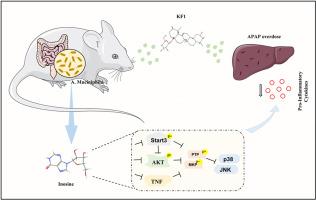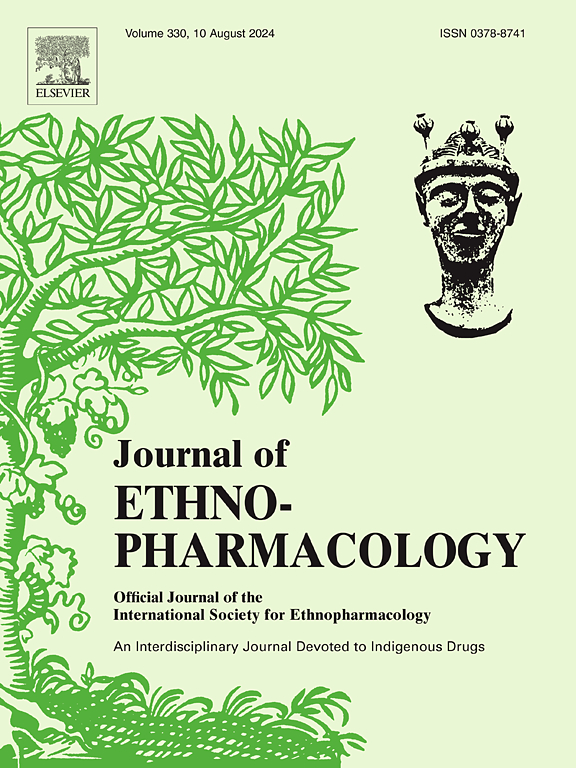The main active component Kaji-ichigoside F1 of the ethnic medicine Rosa roxburghii Tratt prevents acetaminophen-induced acute liver injury by modulating microbial metabolism
IF 5.4
2区 医学
Q1 CHEMISTRY, MEDICINAL
引用次数: 0
Abstract
Ethnopharmacological relevance
Kaji-ichigoside F1 (KF1), the main active component of the Guizhou ethnic medicinal material Rosa roxburghii Tratt, is widely used in China due to its anti-inflammatory properties. However, the protective effects of KF1 against drug-induced liver injury and its potential mechanisms are not yet understood.
Aim of the study
We aimed to investigate the effects of KF1 on acute liver injury (ALI) and explore its underlying mechanisms, particularly its role in modulating the gut microbiota to inhibit ALI development.
Materials and methods
KF1 was prepared via 80 % ethanol extraction, silica gel column chromatography, and Sephadex LH-20 column chromatography. Mouse models of ALI were established using acetaminophen (APAP) treatment, with or without KF1 (5 and 10 mg/kg). 16S rRNA gene sequencing, metabolomics, and transcriptomics approaches were employed to explore the inhibitory effect of KF1 on ALI. Additionally, the role of the gut microbiota was investigated through antibiotic treatment and fecal microbiota transplantation experiments.
Results
Treatment with KF1 significantly altered the gut microbiota composition, notably increasing the abundance of the probiotic Akkermansia muciniphila (A. muciniphila). Furthermore, A. muciniphila enhanced the levels of beneficial metabolites, including inosine. Notably, inosine significantly suppressed inflammatory factors and improved APAP-induced ALI. Transcriptomic analysis revealed that inosine inhibited key signaling pathways, including MAPK, PI3K-AKT, JAK-STAT3, IL-17, TNF, and cytokine–cytokine receptor interactions. Importantly, the preventive effect of KF1 is dependent on microbial mechanisms.
Conclusion
KF1 protects against ALI by modulating the gut microbiota and associated metabolites, thereby promoting a more favorable state and inhibiting pro-inflammatory pathways.

民族药刺梨的主要活性成分刺梨皂苷F1通过调节微生物代谢来预防对乙酰氨基酚所致的急性肝损伤
kaji -ichigoside F1 (KF1)是贵州民族药材刺梨(Rosa roxburghii Tratt)的主要活性成分,具有抗炎作用,在国内得到广泛应用。然而,KF1对药物性肝损伤的保护作用及其潜在机制尚不清楚。本研究旨在研究KF1对急性肝损伤(ALI)的影响,并探讨其潜在机制,特别是其在调节肠道微生物群以抑制ALI发展中的作用。材料与方法经80%乙醇萃取、硅胶柱层析、Sephadex LH-20柱层析制备skf1。用对乙酰氨基酚(APAP)治疗ALI小鼠,添加或不添加KF1(5和10 mg/kg)。采用16S rRNA基因测序、代谢组学和转录组学方法探讨KF1对ALI的抑制作用。此外,通过抗生素治疗和粪便微生物群移植实验,研究了肠道微生物群的作用。结果KF1处理显著改变了肠道菌群组成,显著增加了益生菌嗜粘阿克曼氏菌(a.a muciniphila)的丰度。此外,嗜muciniphila提高了有益代谢产物的水平,包括肌苷。值得注意的是,肌苷显著抑制炎症因子,改善apap诱导的ALI。转录组学分析显示肌苷抑制关键信号通路,包括MAPK、PI3K-AKT、JAK-STAT3、IL-17、TNF和细胞因子-细胞因子受体相互作用。重要的是,KF1的预防作用依赖于微生物机制。结论kf1通过调节肠道菌群和相关代谢物,从而促进更有利的状态,抑制促炎途径,从而预防ALI。
本文章由计算机程序翻译,如有差异,请以英文原文为准。
求助全文
约1分钟内获得全文
求助全文
来源期刊

Journal of ethnopharmacology
医学-全科医学与补充医学
CiteScore
10.30
自引率
5.60%
发文量
967
审稿时长
77 days
期刊介绍:
The Journal of Ethnopharmacology is dedicated to the exchange of information and understandings about people''s use of plants, fungi, animals, microorganisms and minerals and their biological and pharmacological effects based on the principles established through international conventions. Early people confronted with illness and disease, discovered a wealth of useful therapeutic agents in the plant and animal kingdoms. The empirical knowledge of these medicinal substances and their toxic potential was passed on by oral tradition and sometimes recorded in herbals and other texts on materia medica. Many valuable drugs of today (e.g., atropine, ephedrine, tubocurarine, digoxin, reserpine) came into use through the study of indigenous remedies. Chemists continue to use plant-derived drugs (e.g., morphine, taxol, physostigmine, quinidine, emetine) as prototypes in their attempts to develop more effective and less toxic medicinals.
 求助内容:
求助内容: 应助结果提醒方式:
应助结果提醒方式:


